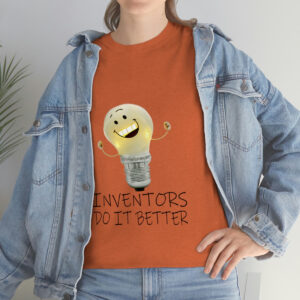THE ETHICS OF PATENT ENFORCEMENT: HOW TO PROTECT YOUR INVENTION WITHOUT RESORTING TO LITIGATION
As an inventor, you have spent countless hours developing your invention or product design, and you want to ensure that it is protected from infringement. However, resorting to litigation may not always be the best option. The ethics of patent enforcement are a crucial consideration for any inventor, as it can impact your reputation and the success of your invention. In this blog post, we will explore how to protect your invention without resorting to litigation. We will discuss alternative methods such as licensing, trade secrets, and non-disclosure agreements.
By understanding the ethics of patent enforcement, you can safeguard your invention while maintaining your integrity as an inventor. So, let’s dive in and explore the various options available to you.
THE ETHICS OF PATENT ENFORCEMENT: HOW TO PROTECT YOUR INVENTION WITHOUT RESORTING TO LITIGATION
Innovation is the cornerstone of progress, and the protection of intellectual property rights is essential to encourage and reward innovation. Patents are one of the most effective ways to protect inventions, but enforcing them can be a complex and costly process. Patent litigation can be a long and arduous process, and it can be difficult to determine the ethical boundaries of patent enforcement. In this article, we will explore the ethics of patent enforcement and provide some tips on how to protect your invention without resorting to litigation.
The Importance of Patent Protection
Patent protection is essential for inventors and businesses that invest time and resources in developing new products and technologies. Patents provide a legal monopoly on the invention for a limited period, allowing the inventor to prevent others from making, using, or selling the invention without permission. This exclusivity provides a financial incentive for inventors to continue innovating and developing new products.
Patent protection also benefits society as a whole by encouraging innovation and promoting economic growth. Patents provide a framework for sharing knowledge and ideas, allowing others to build on existing inventions and create new products and technologies. This process of innovation and improvement benefits consumers by providing them with better products and services at lower prices.
The Ethics of Patent Enforcement
While patent protection is essential, the ethics of patent enforcement can be complex. Patent litigation can be a long and costly process, and it can be difficult to determine the ethical boundaries of patent enforcement.
Some patent holders may use their patents to stifle competition or extract excessive licensing fees, which can harm innovation and limit consumer choice. One of the key ethical considerations in patent enforcement is the balance between protecting the inventor’s rights and promoting competition and innovation. While patents provide a legal monopoly on the invention, they should not be used to prevent others from developing similar products or technologies. In some cases, patent holders may use their patents to prevent others from entering the market, even if their products do not infringe on the patent. This can harm competition and limit consumer choice, which is not in the public interest.
Another ethical consideration in patent enforcement is the use of patent trolls. Patent trolls are companies that acquire patents solely for the purpose of suing other companies for infringement. These companies do not produce any products or services themselves, but instead rely on litigation to generate revenue. This practice is widely considered unethical, as it does not promote innovation or benefit consumers.
Tips for Protecting Your Invention Without Resorting to Litigation
While patent litigation can be a necessary tool for protecting your invention, there are other ways to protect your intellectual property without resorting to litigation. Here are some tips for protecting your invention without going to court:
- Conduct a Patent Search
Before filing for a patent, it is essential to conduct a thorough patent search to ensure that your invention is novel and non-obvious. A patent search can help you identify any existing patents or patent applications that may be similar to your invention. This can help you avoid infringing on existing patents and increase the chances of your patent being granted. - File for a Patent
Filing for a patent is the most effective way to protect your invention. A patent provides a legal monopoly on the invention for a limited period, allowing you to prevent others from making, using, or selling the invention without permission. Filing for a patent can be a complex process, but it is essential for protecting your intellectual property. - Use Non-Disclosure Agreements
Non-disclosure agreements (NDAs) can be an effective way to protect your invention when working with others. NDAs are legal agreements that prohibit the recipient from disclosing confidential information to third parties. This can help prevent others from stealing your invention or using it without permission. - Monitor the Market
Monitoring the market can help you identify any potential infringement of your patent. This can help you take action before the infringement becomes widespread, reducing the need for litigation. Monitoring the market can also help you identify potential licensing opportunities or partnerships. - Consider Licensing
Licensing your patent can be an effective way to generate revenue from your invention without resorting to litigation. Licensing allows others to use your invention in exchange for a licensing fee or royalty. This can be a win-win situation for both parties, as the licensee can benefit from your invention while you generate revenue.
Conclusion
Patent protection is essential for promoting innovation and economic growth, but enforcing patents can be a complex and costly process. The ethics of patent enforcement can be difficult to determine, and it is essential to balance the inventor’s rights with the public interest. While patent litigation can be a necessary tool for protecting your invention, there are other ways to protect your intellectual property without resorting to litigation. Conducting a patent search, filing for a patent, using non-disclosure agreements, monitoring the market, and considering licensing are all effective ways to protect your invention without going to court. By following these tips, you can protect your intellectual property and promote innovation and economic growth.
- What is the USA Patriot Web
The Department of Justice’s first priority is to prevent future terrorist attacks. … Allows law enforcement to conduct investigations without tipping off … - The FTC’s Endorsement Guides: What People Are Asking | Federal …
Sep 7, 2017 … Generally not, but if concerns about possible violations of the FTC Act come to our attention, we evaluate them case by case. If law enforcement … - Title IX Legal Manual
It is intended to be an abstract of general principles and issues for use by various federal agencies charged with enforcing Title IX and is not intended to … - 2164-The Enablement Requirement
Detailed procedures for making and using the invention may not be necessary … Compliance with the enablement requirement of 35 U.S.C. 112(a) or pre-AIA 35 … - Executive Order on Protecting Public Health and the Environment …
Jan 20, 2021 … Leaving the Keystone XL pipeline permit in place would not be consistent with my Administration’s economic and climate imperatives. Sec. 7. - Enforcement Guidance: Vicarious Liability for Unlawful Harassment …
Jun 18, 1999 … ” The Court stated that an employer is liable for hostile work environment harassment by employees who are not supervisors if the employer was … - Code of Conduct for Law Enforcement Officials | OHCHR
Article 1 Law enforcement officials shall at all times fulfil the duty imposed upon them by law, by serving the community and by protecting all persons … - Interfering with employee rights (Section 7 & 8(a)(1)) | National …
Employees have the right to unionize, to join together to advance their interests … For example, employers may not respond to a union organizing drive by … - Enforcement Guidance on Retaliation and Related Issues | U.S. …
Aug 25, 2016 … The communication itself may be informal and need not include the words “harassment,” “discrimination,” or any other legal terminology, as long … - Bargaining in good faith with employees’ union representative …
Employers have a legal duty to bargain in good faith with their … changes without bargaining with the union and not to bypass the union and deal directly …
The lesser-known side of The Ethics of Patent Enforcement: How to Protect Your Invention without Resorting to Litigation
- The first recorded patent was granted in Venice, Italy in 1474 for a new method of glassmaking.
- In the United States, patents are granted by the United States Patent and Trademark Office (USPTO).
- Patents provide legal protection for inventions or discoveries that are novel, non-obvious and useful.
- The duration of a patent is typically 20 years from the date of filing.
- Patents can be licensed or sold to others for commercial use.
- Patent infringement occurs when someone uses an invention without permission from the patent holder.
- Litigation can be costly and time-consuming for both parties involved in a patent dispute.
- Alternative methods of resolving disputes include mediation and arbitration.

Are you ready to become an inventor?
Getting your idea out of your head and into your hands is only the first in a long set of steps towards becoming a successful inventor.

First Steps To A Successful Invention
At Invention Therapy, we believe that the power of the internet makes it easier than you think to turn your invention idea into a reality. In most cases, you can build a prototype and start manufacturing a product on your own. Changing your way of thinking can be difficult. Being an inventor requires you to balance your passion with the reality of having to sell your products for a profit. After all, if we can't make a profit, we won't be able to keep the lights on and continue to invent more amazing things!Please subscribe to our Youtube Channel!




